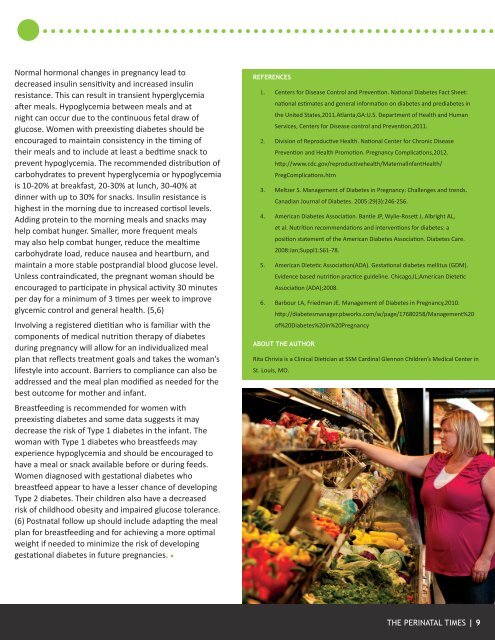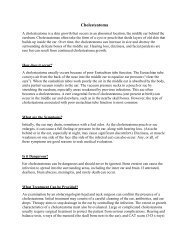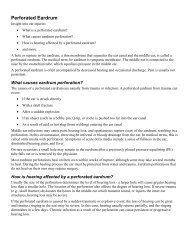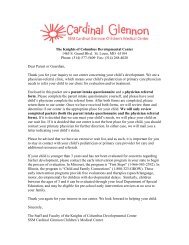perinatal-times_2013-03_print_and_read - SSM Cardinal Glennon ...
perinatal-times_2013-03_print_and_read - SSM Cardinal Glennon ...
perinatal-times_2013-03_print_and_read - SSM Cardinal Glennon ...
You also want an ePaper? Increase the reach of your titles
YUMPU automatically turns print PDFs into web optimized ePapers that Google loves.
Normal hormonal changes in pregnancy lead todecreased insulin sensitivity <strong>and</strong> increased insulinresistance. This can result in transient hyperglycemiaafter meals. Hypoglycemia between meals <strong>and</strong> atnight can occur due to the continuous fetal draw ofglucose. Women with preexisting diabetes should beencouraged to maintain consistency in the timing oftheir meals <strong>and</strong> to include at least a bedtime snack toprevent hypoglycemia. The recommended distribution ofcarbohydrates to prevent hyperglycemia or hypoglycemiais 10-20% at breakfast, 20-30% at lunch, 30-40% atdinner with up to 30% for snacks. Insulin resistance ishighest in the morning due to increased cortisol levels.Adding protein to the morning meals <strong>and</strong> snacks mayhelp combat hunger. Smaller, more frequent mealsmay also help combat hunger, reduce the mealtimecarbohydrate load, reduce nausea <strong>and</strong> heartburn, <strong>and</strong>maintain a more stable postpr<strong>and</strong>ial blood glucose level.Unless contraindicated, the pregnant woman should beencouraged to participate in physical activity 30 minutesper day for a minimum of 3 <strong>times</strong> per week to improveglycemic control <strong>and</strong> general health. (5,6)Involving a registered dietitian who is familiar with thecomponents of medical nutrition therapy of diabetesduring pregnancy will allow for an individualized mealplan that reflects treatment goals <strong>and</strong> takes the woman’slifestyle into account. Barriers to compliance can also beaddressed <strong>and</strong> the meal plan modified as needed for thebest outcome for mother <strong>and</strong> infant.Breastfeeding is recommended for women withpreexisting diabetes <strong>and</strong> some data suggests it maydecrease the risk of Type 1 diabetes in the infant. Thewoman with Type 1 diabetes who breastfeeds mayexperience hypoglycemia <strong>and</strong> should be encouraged tohave a meal or snack available before or during feeds.Women diagnosed with gestational diabetes whobreastfeed appear to have a lesser chance of developingType 2 diabetes. Their children also have a decreasedrisk of childhood obesity <strong>and</strong> impaired glucose tolerance.(6) Postnatal follow up should include adapting the mealplan for breastfeeding <strong>and</strong> for achieving a more optimalweight if needed to minimize the risk of developinggestational diabetes in future pregnancies. ●REFERENCES1. Centers for Disease Control <strong>and</strong> Prevention. National Diabetes Fact Sheet:national estimates <strong>and</strong> general information on diabetes <strong>and</strong> prediabetes inthe United States,2011.Atlanta,GA:U.S. Department of Health <strong>and</strong> HumanServices, Centers for Disease control <strong>and</strong> Prevention,2011.2. Division of Reproductive Health. National Center for Chronic DiseasePrevention <strong>and</strong> Health Promotion. Pregnancy Complications,2012.http://www.cdc.gov/reproductivehealth/MaternalInfantHealth/PregComplications.htm3. Meltzer S. Management of Diabetes in Pregnancy: Challenges <strong>and</strong> trends.Canadian Journal of Diabetes. 2005:29(3):246-256.4. American Diabetes Association. Bantle JP, Wylie-Rosett J, Albright AL,et al. Nutrition recommendations <strong>and</strong> interventions for diabetes: aposition statement of the American Diabetes Association. Diabetes Care.2008:Jan;Suppl1:S61-78.5. American Dietetic Association(ADA). Gestational diabetes mellitus (GDM).Evidence based nutrition practice guideline. Chicago,IL;American DieteticAssociation (ADA);2008.6. Barbour LA, Friedman JE. Management of Diabetes in Pregnancy,2010.http://diabetesmanager.pbworks.com/w/page/17680258/Management%20of%20Diabetes%20in%20PregnancyABOUT THE AUTHORRita Chrivia is a Clinical Dietician at <strong>SSM</strong> <strong>Cardinal</strong> <strong>Glennon</strong> Children’s Medical Center inSt. Louis, MO.THE PERINATAL TIMES | 9
















